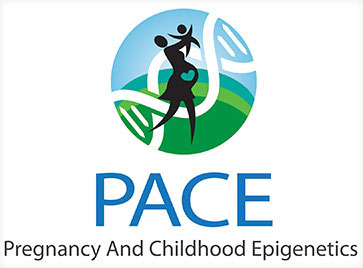Mothers’ Smoking Leaves Unique Marks on Infants’ DNA
Smoking While Pregnant Affects a Woman’s Genes Differently From Her Baby’s

New IRP research has identified more than 700 genes that are not affected by an adult’s own smoking behavior but may function differently in infants born to mothers who smoked during pregnancy.
Decades of public health campaigns have made the health consequences of smoking common knowledge. However, for the few women who smoke while pregnant, the habit can affect not only their own bodies but also those of their unborn children. Intriguingly, according to a new study led by IRP researchers, so-called ‘epigenetic’ changes to DNA that can alter the behavior of genes differ significantly in smoking mothers compared to their babies, suggesting that maternal smoking may have unique, long-lasting effects on the way a child’s body functions.1
Infants born to mothers who smoked during pregnancy tend to weigh less and have impaired lung function at birth. They also have a higher risk of lower respiratory illness during childhood. In an effort to determine the biological mechanisms behind the effects of smoking on mothers and their developing babies, researchers like IRP senior investigator Stephanie London, M.D., Dr.P.H., have looked at how a mother’s smoking alters an epigenetic process called DNA methylation. DNA methylation adds chemical tags called methyl groups to DNA at locations called CpG sites where the DNA sequence has a ‘C’ followed by a ‘G.’ Changing the amount of methylation at a gene’s CpG sites can alter that gene’s production of the protein it codes for.
In the new study, Dr. London's team examined DNA methylation data from two groups: nearly 5,000 infants enrolled in studies that are part of the Pregnancy and Childhood Epigenetics (PACE) consortium and more than 9,300 adults who participated in studies that are part of the Cohorts for Heart and Aging Research in Genomic Epidemiology (CHARGE) consortium. Dr. London and her colleagues specifically wanted to find genes where methylation did not differ between adult smokers and non-smokers but did differ between babies born to women who smoked during pregnancy and the babies of women who did not smoke during pregnancy.

The new study’s data came in part from the Pregnancy and Childhood Epigenetics (PACE) consortium, which comprises researchers from NIH and around the world who study how environmental exposures in early life affect human health via epigenetic processes.
“There’s a big difference in the exposure that a fetus gets from his or her mother’s smoking and the exposure the mother gets herself,” Dr. London explains. “When you smoke a cigarette, you’re both directly exposing your lungs to certain chemicals and also absorbing those chemicals into your blood through your lungs, but a fetus is not personally inhaling those substances, so it is only exposed to what is absorbed into the blood.”
Dr. London’s team identified 34,541 CpG sites in adults where methylation varied based on whether the individual smoked. In addition, the researchers found 5,547 CpG sites that showed different levels of methylation in infants depending on whether or not their mothers smoked during pregnancy, including 3,838 CpG sites where methylation was altered by smoking in the newborns but not in adults.
Finally, the scientists identified 743 genes that contained at least one CpG site in infants, but none in adults, where methylation was altered by smoking. This enabled the researchers to zero in on genes in which smoking influenced methylation only in newborns, providing a means of identifying potential bodily processes that might be uniquely affected in newborns by their mothers’ smoking. Indeed, using a technique called pathway analysis, the researchers found that several of the genes where methylation was affected in newborns but not adults were involved in the production of inflammatory molecules called cytokines and the way the body handles certain chemicals — both those found in tobacco smoke, like nicotine, and also compounds found in some pharmaceuticals. If these effects persist into childhood or adulthood, as some research suggests they do, then they could potentially influence infants’ future health.
“That’s a big part of research on the developmental origins of health and disease,” Dr. London says. “Even a modest resetting of some of these systems could have a life-long impact.”
The new findings could help future studies focus on specific biological processes that may be profoundly altered in infants born to mothers who smoked during pregnancy. In addition, the research could lead to objective, quantitative biomarkers that would allow scientists and clinicians to glean information about people’s smoking behavior by analyzing their blood.
In the nearer term, Dr. London’s group is planning follow-up studies that may produce additional intriguing discoveries by examining data from larger numbers of adults and newborns. Meanwhile, other researchers will need to figure out the biological mechanisms by which a mother’s smoking alters DNA methylation in a developing fetus, as well as why smoking only changes methylation in certain genes.
“I think it would really help this research in the future to study these mechanisms,” Dr. London says. “It’s hard to make deeper biological insights without knowing why you’re getting these gene-specific effects.”
Subscribe to our weekly newsletter to stay up-to-date on the latest breakthroughs in the NIH Intramural Research Program.
References:
[1] Comparison of smoking-related DNA methylation between newborns from prenatal exposure and adults from personal smoking. Sikdar S, Joehanes R, Joubert BR, Xu CJ, Vives-Usano M, Rezwan FI, Felix JF, Ward JM, Guan W, Richmond RC, Brody JA, Küpers LK, Baïz N, Håberg SE, Smith JA, Reese SE, Aslibekyan S, Hoyo C, Dhingra R, Markunas CA, Xu T, Reynolds LM, Just AC, Mandaviya PR, Ghantous A, Bennett BD, Wang T, Consortium TB, Bakulski KM, Melen E, Zhao S, Jin J, Herceg Z, Meurs JV, Taylor JA, Baccarelli AA, Murphy SK, Liu Y, Munthe-Kaas MC Deary IJ Nystad W, Waldenberger M Annesi-Maesano I, Conneely K, Jaddoe VW, Arnett , Snieder H, Kardia SL, Relton CL, Ong KK, Ewart S, Moreno-Macias H, Romieu I, Sotoodehnia N, Fornage M, Motsinger-Reif A, Koppelman GH, Bustamante M, Levy D, London SJ. Epigenomics. 2019 Oct;11(13):1487-1500. doi: 10.2217/epi-2019-0066.
Related Blog Posts
This page was last updated on Tuesday, January 30, 2024
